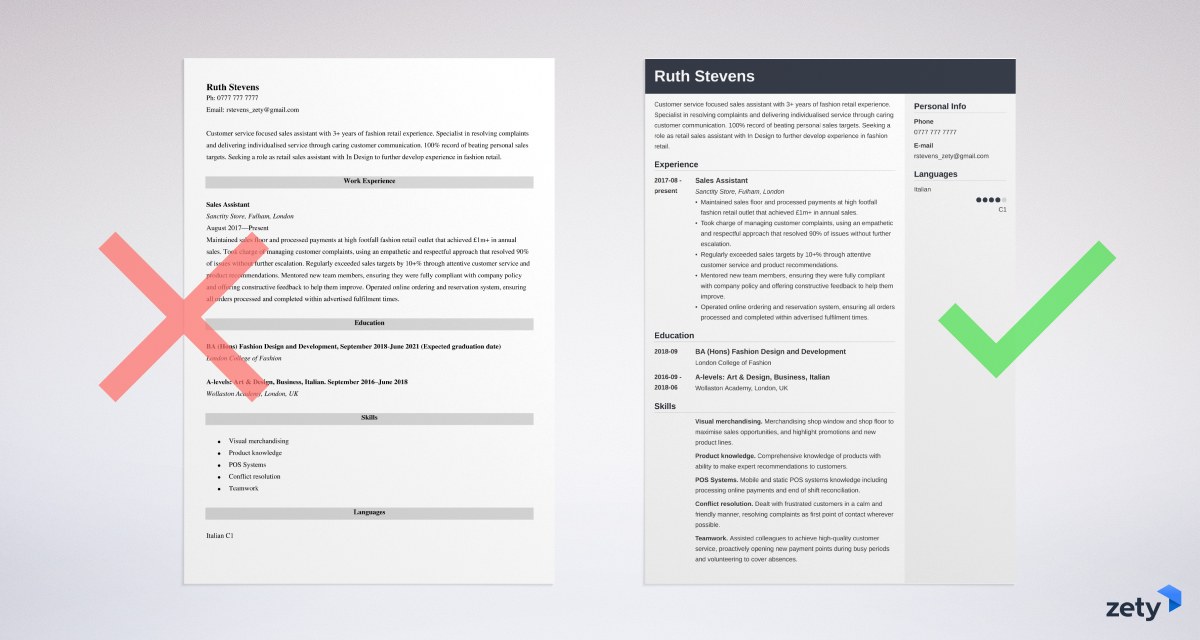Top Interpersonal Skills You Need for Career Success
Create your CV nowWe live in a world that’s increasingly automated. Every technological development seems to reduce the need for human contact. So it’s all too easy to assume that interpersonal skills are on the way out.
But nothing could be further from the truth. Virtually every job still involves communicating with other people to some extent, whether it’s between colleagues, customers or clients. So having good interpersonal skills remains a key requirement for success at work.
In fact, it’s fair to say that having strong interpersonal skills is a crucial part of success in life in general. And you’re about to learn everything you need to know about them. Read on and you’ll discover:
- What are interpersonal skills?
- A list of good interpersonal skills examples
- How to improve your interpersonal skills
- And how to include interpersonal skills in your CV
Want to save time and have your CV ready in 5 minutes? Try our CV builder. It’s fast and easy to use. Plus, you’ll get ready-made content to add with one click. See 20+ CV templates and create your CV here.
Sample CV made with our builder—See more CV examples here.
And once you’ve perfected your interpersonal skills we’ve got a great selection of other CV writing guides too.
- What Personal Details Should Be on a CV?
- 50+ Essential CV Computer Skills
- Resume vs CV: What’s the Difference?
- What Should a CV Look Like?
- Free CV Builder Reviews and Alternatives
- References on a CV: Should You Include Them
- How to Write a CV for Work Experience Opportunities
- 15+ Editable CV Templates for Free Download
- Please Find Attached My CV: The Best Way to Say It
- Should a CV Be One Page & How to Make it Fit
Interpersonal Skills CV Example
Ruth Stevens
Ph: 0777 777 7777
Email: rstevens_zety@gmail.com
Customer service focused sales assistant with 3+ years of fashion retail experience. Specialist in resolving complaints and delivering individualised service through caring customer communication. 100% record of beating personal sales targets. Seeking a role as retail sales assistant with In Design to further develop experience in fashion retail.
Work Experience
Sales Assistant
Sanctity Store, Fulham, London
August 2017—Present
- Maintained sales floor and processed payments at high footfall fashion retail outlet that achieved £1m+ in annual sales.
- Took charge of managing customer complaints, using an empathetic and respectful approach that resolved 90% of issues without further escalation.
- Regularly exceeded sales targets by 10+% through attentive customer service and product recommendations.
- Mentored new team members, ensuring they were fully compliant with company policy and offering constructive feedback to help them improve.
- Operated online ordering and reservation system, ensuring all orders processed and completed within advertised fulfilment times.
Education
BA (Hons) Fashion Design and Development, September 2018-June 2021 (Expected graduation date)
London College of Fashion
A-levels: Art & Design, Business, Italian. September 2016–June 2018
Wollaston Academy, London, UK
Skills
- Visual merchandising. Merchandising shop window and shop floor to maximise sales opportunities, and highlight promotions and new product lines.
- Product knowledge. Comprehensive knowledge of products with ability to make expert recommendations to customers.
- POS Systems. Mobile and static POS systems knowledge including processing online payments and end of shift reconciliation.
- Conflict resolution. Dealt with frustrated customers in a calm and friendly manner, resolving complaints as first point of contact wherever possible.
- Teamwork. Assisted colleagues to achieve high-quality customer service, proactively opening new payment points during busy periods and volunteering to cover absences.
Languages
- Italian C1
Expert Curated Video Content
If you prefer watching, our Certified Professional CV Writer, Caio, will explain in detail everything about interpersonal skills!
What Are Interpersonal Skills?
Interpersonal skills are the skills we use to communicate with other people and build relationships with them. For this reason they’re also known as ‘people skills’ and tend to focus on communication skills such as listening, speaking and body language.
They’re also a soft skill, which means they’re transferable across a wide range of career sectors. Hence why they’re widely considered a vital part of professional success.
Why Are Interpersonal Skills Important?
Strong interpersonal skills are extremely important in every aspect of work, from performing well in a job interview to dealing with your day-to-day tasks and responsibilities. Being able to understand others and work together to achieve common business goals sets the foundation for success in almost every job.
To look at it another way, a lack of interpersonal communication skills is often cited as being a key cause of organisational failings. Silo working, bad management and lack of effective team working are all related to interpersonal communication and are major causes of poor productivity and low morale.
So having excellent interpersonal skills is a key factor for success, both for individuals and the organisations they work in.
Top Interpersonal Skills Examples
Strong interpersonal skills are incredibly valuable to employers. They increase productivity and make for a more pleasant working environment.
Here’s a list of interpersonal skills examples that will stand you in good stead with every employer.
1. Teamwork
It’s the quintessential quality of being able to work well with others. Teamwork skills is an umbrella term that covers a broad range of abilities and being a good team player is often key to career advancement.
2. Leadership
Leadership skills and interpersonal skills go hand in hand. Effective leaders are skilled at communicating effectively with others. Any situation involving organising and guiding others towards a common goal requires good leadership.
3. Active Listening
Good interpersonal skills are a two-way street. It’s just as important to be able to receive and gather information from others as it is to communicate your own ideas. That’s where active listening comes in. It means engaging with the speaker by showing interest in what they’re saying and using encouraging gestures, sounds and questions to keep them talking and elicit the information you need.
4. Empathy
Empathy involves your ability to understand the emotions of others. It’s also referred to as ‘emotional intelligence’ and it’s a key factor in creating a pleasant working environment. It also plays a vital role in the day-to-day tasks of certain careers, such as customer service.
5. Conflict Management
Conflict management is a key example of interpersonal skills, both for working in teams and dealing with customers. Being able to prevent and defuse conflict through diplomacy, negotiation, assertiveness and respectfulness is key to workplace success.
6. Giving Feedback
Feedback has to be given constructively to be effective. It should be timely, specific and respectful and offer actionable suggestions if there are areas for improvement. Giving positive feedback on a job well done is also an important skill to develop.
7. Receiving Feedback
It’s essential to be able to receive feedback too. View it as a learning opportunity and don’t react in a defensive manner. Listen carefully to the feedback and use it to help improve your skills and performance moving forward.
8. Body Language
Despite what you may have heard, body language doesn’t form 93% of communication. That’s a misinterpretation of a piece of research from the 1960s. It’s still a big factor though, and good interpersonal communication skills require the ability to maintain open, friendly and confident body language. A mix of factors including eye contact, facial expressions, posture and gestures all contribute to effective use of body language.
Read more: Essential Skills List for Your CV
How to Include Interpersonal Skills on Your CV
It’s worth repeating that everyone needs good interpersonal skills, regardless of your career. So they’re a particularly important consideration when deciding what to include in your CV. Now we’ll take a look at how to write a CV so it’s packed with interpersonal skills from top to bottom.
1. Start with Your CV Profile
Don’t wait for your skills section to start mentioning your interpersonal skills. Also known as a CV summary, your CV profile is the first thing a recruiter will read so it’s the perfect opportunity to introduce your interpersonal skills right from the start. Here’s an example:
Customer service focused sales assistant with 3+ years of fashion retail experience. Specialist in resolving complaints and delivering individualised service through caring customer communication. 100% record of beating personal sales targets. Seeking a role as retail sales assistant with In Design to further develop experience in fashion retail.
2. Write an Impactful Work Experience Section
No section of your CV is as important as your work experience section. It’s where you prove you can use your interpersonal skills to achieve professional success. Here are some CV tips to write it well, followed by an example.
- List achievements that you’ve accomplished as a result of your interpersonal skills and use numbers to quantify them.
- Rather than just say what you did, prove how well you did it by using accomplishment statements.
- Start off each bullet point with a CV action verb for extra impact. Think influenced, negotiated and authorised rather than ‘responsible for’.
Sales Assistant
Sanctity Store, Fulham, London
August 2017—Present
- Maintained sales floor and processed payments at high footfall fashion retail outlet that achieved £1m+ in annual sales.
- Took charge of managing customer complaints, using an empathetic and respectful approach that resolved 90% of issues without further escalation.
- Regularly exceeded sales targets by 10+% through attentive customer service and product recommendations.
- Mentored new team members, ensuring they were fully compliant with company policy and offering constructive feedback to help them improve.
- Operated online ordering and reservation system, ensuring all orders processed and completed within advertised fulfilment times.
3. Make Use of Your Education Section
If you’re writing a student CV or a graduate CV you won’t have as much professional experience to draw on. So if you’re just starting out in your career, add some more detail to your CV education section. Include individual modules you’ve studied or extracurricular activities that help to prove you have good interpersonal skills.
BSc Biological Sciences, September 2016–June 2020
University of Liverpool
- Extracurricular activities: captain of university rowing squad and volunteer rowing coach for Merseyside Rowing Club.
4. Smarten up Your Skills Section
Don’t just use your CV skills section to throw in a randomly chosen list of abilities. Make it focused and impactful. Here’s how:
- Make it targeted. Don’t paste in the same skills list for every application, you need to make your skills section tailored for every individual job application. Do it by reading the job advert, noting the skills mentioned and then choosing from your own skill set to match the requirements as closely as you can.
- Add details. For each skill, write a brief statement explaining your proficiency and how you demonstrate it.
- Conflict resolution. Dealt with frustrated customers in a calm and friendly manner, resolving complaints as first point of contact wherever possible.
- Teamwork. Assisted colleagues to achieve high-quality customer service, proactively opening new payment points during busy periods and volunteering to cover absences.
5. Include Additional Sections
Adding extra sections is one of the best ways of standing out from other candidates. You can add extra examples of your interpersonal skills and distinguish yourself as an individual. Here are some ideas that will work well:
- If you can speak another language then definitely include a languages section on your CV. It’s a big boost to employability in many jobs and an important interpersonal communication skill in its own right.
- Include a CV hobbies and interests section. Just make sure the interests you mention are relatable and actually do demonstrate your interpersonal skills. Playing and coaching team sports is a classic example.
Languages
- Italian C1
When making a CV in our builder, drag & drop bullet points, skills, and auto-fill the boring stuff. Spell check? Check. Start building your CV here.
When you’re done, Zety’s CV builder will score your CV and tell you exactly how to make it better.
How to Improve Interpersonal Skills
Strong interpersonal skills such as leadership, negotiation and empathy are essential requirements for many different jobs. Other qualifications considered essential for every career include communication and teamwork.
So whatever your job and level of seniority, you need to have excellent interpersonal skills. And here are some ways you can improve them.
1. Identify Areas for Improvement
The following suggestions are universal, but you also need to know the specific types of interpersonal skills you need to develop as an individual. Get feedback from managers and colleagues because it’s hard to be truly objective about yourself. This also gives you the chance to practise your ability to receive feedback, so it’s a doubly useful exercise.
2. Practise Active Listening
We’ve already mentioned this as a top interpersonal skill. But like all skills, it takes practice. So make the effort to develop your active listening skills whenever you speak to colleagues or customers. Listen attentively, ask for clarification, paraphrase and repeat back what they said and hold back on giving judgment or advice. Be fully engaged whenever you communicate, and your active listening skills are bound to improve.
3. Remain Calm
Keeping a level-headed attitude is another important interpersonal skill worth developing. If you do feel overly irritated or any other extreme form of emotion it’s best to take a deep breath and try to relax so you can express yourself in a calm and professional manner.
4. Be Assertive
It’s important to be confident in your abilities and be able to express your needs. And you need to be able to do so in a way that doesn’t come across as aggressive or arrogant.
5. Develop Empathy
Actively make the effort to be empathetic with colleagues and customers. Put yourself in their place and think of why they feel the way they do and react in certain situations. By carefully considering their perspectives you’ll be able to communicate with them more effectively and develop better solutions to problems and challenges.
6. Maintain Your Networks
Keep in touch with former colleagues and people you studied with. Building and maintaining connections and networks is an undervalued interpersonal skill that can be a great asset in advancing your career.
7. Acknowledge Others
Let your colleagues know you appreciate them. Ask for their assistance in their areas of expertise, thank them for helping you and give them credit for a job well done. This way you’ll build relationships and strengthen your ability to work as part of a team.
8. Ask About Training Opportunities
Most successful employers recognise the importance of upskilling their workforce. Ask your manager or your HR team about what training opportunities are available to improve your interpersonal skills. It’s confirmed by science too. The consensus is that interpersonal skills can indeed be improved by training.
9. Take a Course
Don’t be limited by what your employer has to offer. There is an incredible variety of interpersonal skills training opportunities available online. Simply identify the area you want to improve and look for courses from a reputable provider. A few reliable suggestions are The Open University, Udemy and Coursera.
10. Practise and Polish
Put your learning into action. Consciously make a point of practising your interpersonal skills. This will make implementing them feel more natural and the more you put them into action the better you’ll get.
Plus, a great cover letter that matches your CV will give you an advantage over other candidates. You can write it in our cover letter builder here. Here's what it may look like:
See more cover letter templates and start writing.
Key Takeaway
Having good interpersonal skills is essential for success in almost every job. Regardless of what stage of your career you’re at, take the opportunity to practise and perfect your interpersonal skills. It helps to create a more positive and productive work environment for you and your colleagues. And finally, for the perfect CV, weave in examples of interpersonal skills throughout.
Thanks for reading. If you’re still struggling to define interpersonal skills, or you just need some advice on how to include them in your CV, then let us know in the comments section. We’re here to help.
About Zety’s Editorial Process
Our editorial team has thoroughly reviewed this article to ensure it follows Zety’s editorial guidelines. Our dedication lies in sharing our expertise and providing you with actionable career advice that offers you real value. Every year, the quality of our content attracts 40 million readers to our site. But that’s not all – we conduct original research to gain a detailed understanding of the labour market. We take pride in being cited by top universities and leading media outlets in the UK and worldwide.






